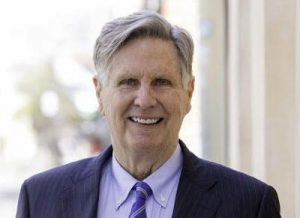Commentary: Employer-mandated vaccinations are not an assault on our liberty
By Allan R. Holmes
Increasingly, employers are requiring employees to vaccinate against COVID-19 because they recognize the social and economic benefits of a fully vaccinated workforce. Employers hope to free their workplaces, their employees and our economy from the continuing devastation of the pandemic.
But as is the case with all things COVID, social media and politicians seem never at a loss for misinformation, as they vow to protect our freedom and liberty to go unvaccinated.
Of what “liberty” do they speak? Our Constitution is the bedrock for the protection of all our liberties. Nothing there. The Constitution protects us only from governmental actions. Private employers are not governmental actors. As far as the Constitution is concerned, private employers are completely free to require their employees to get vaccinated.
As for public employers, with precedent dating back more than 100 years to Jacobson v. Massachusetts, the U.S. Supreme Court has made it clear that the Constitution allows mandatory, governmentally required vaccinations — even for individuals who object on the basis of sincere religious beliefs.
In 2011, the 4th Circuit, our federal appellate court, upheld statutorily mandated vaccinations for schoolchildren despite their parents’ religious objections (Workman v. Mingo County Board of Education). Per the court: The right to practice religion freely does not include any liberty to expose the community or the child to communicable disease, ill health or death.
There are a couple of federal statutes that place some limitations on employer-mandated vaccinations. These limitations are rational, discrete and manageable. Title VII of the Civil Rights Act of 1964 applies to private employers with more than 15 employees and all governmental employers; it protects employees from discrimination on the basis of religion. And the Americans with Disabilities Act applies to private employers with more than 15 employees and most governmental employers; it prohibits discrimination against employees with disabilities.
These laws allow employers to mandate employee vaccinations if reasonable accommodations are made for employees with sincerely held religious beliefs or with disabilities. In other words, there’s no wholesale “liberty” to be free from vaccination. Rather, there are a limited number of employees to whom the employer must provide a limited, reasonable accommodation.
Under Title VII, the test for accommodation is whether an employee’s sincerely held religious belief would cause the employer to incur more than de minimis (minimal) cost. That is to say, an employer doesn’t have to incur much cost before rejecting accommodation.
Consequently, Title VII is unlikely to require much accommodation for employees who interact with the public, or their co-employees, but want to continue working while refusing to be vaccinated. The potential costs of COVID infection are more than de minimis. Unvaccinated employees are more likely both to become infected and to suffer serious illness. Because of their higher likelihood of infection, they are more likely to infect others — co-employees and customers. This analysis is the sort that empowers employers to remove the unvaccinated from the active workforce — hence United Airlines’ recent decision to require employees to take unpaid leave after they successfully claimed a religious exemption from vaccination.
Under the Americans with Disabilities Act, an employee must have a disability that prevents the employee from getting vaccinated. The term “disability” is given an expansive meaning under the ADA, but if we ignore the outlier kooks (mostly found in YouTube videos or Facebook comments), the consensus of medical experts is that there are very few medical conditions that contraindicate COVID vaccination. Without such a medical condition, there is no potential ADA claim.
Accommodations such as frequent testing, constant wearing of face masks, social distancing and modified working hours might be sufficient to meet the needs of employers who want a fully vaccinated workforce but who also need to accommodate employees qualifying for an exemption. These types of accommodations likely will weed out anti-vaxxers without legitimate exemptions.
Compliance with Title VII and the Americans with Disabilities Act will not be an insurmountable hardship for employers. It never has been. Mandatory vaccination programs are being, and will be, successfully implemented without violating any employee’s lawfully protected interest.
We remain in a severe health crisis that threatens our economy and the livelihoods and lives of workers. More and more employers realize that a fully vaccinated workforce is the best way out. It is past time for politicians to cease their destructive demagoguery and begin to support employer-mandated vaccinations.
Attorney Allan R. Holmes of Gibbs & Holmes is a certified specialist in employment and labor law.